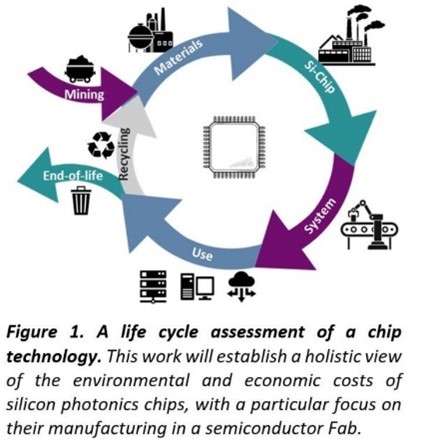Assessing the environmental impact and economical cost of future silicon photonic technologies
PhD - Leuven | More than two weeks ago
Sustainability is one of the key challenges of our society and it is important to control and reduce the ecological impact of the technologies under development. The evolution of semiconductor technologies has however been driven for several decades by other factors: increase of performance, reduction of consumed power, area and cost. Despite gains in performance leading to lower resource and energy consumption, the deployment of electronics in almost all application domains results in a global environmental footprint that has been exponentially increasing and will keep doing so for the decade to come. The areas of particular concern for the semiconductor industry are the greenhouse gas emissions, the consumption of scarce minerals and the usage of water.
In the broad range of technologies enabled by the semiconductor industry, optical interconnects hold the promise to enable efficient and fast inter-chip communication and thereby face the ever-increasing amount of information handled in data centers with a limited usage of power. The optical interconnects developed at imec are based on silicon photonics fabricated in semiconductor fabs. This technology is the object of intense research today and the integration of III-V semiconductor materials such as InP, GaAs, GaN further reinforces its performance and future adoption. The expected gains in interconnect performance that translate in system-level performance gains during the use-phase, should also be evaluated in terms of the environmental and economical costs during the manufacturing of silicon photonics technologies. It is therefore important to develop a holistic view of the consumption of resources for silicon photonics during its entire life cycle, including manufacturing, use and end-of-life phases.
For that purpose, life cycle assessment (LCA) methods can be applied to the semiconductor field (see Figure). With LCA, it is possible to draw an inventory of all resource and energy that are necessary to manufacture, use and dispose of a semiconductor chip. This inventory can then be translated into a quantification of the environmental impacts and economical costs. LCA can be performed with a high granularity, revealing fine details of technological choices. And LCA results can be projected to the future, providing guidance to choose technological options with minimized impact.
In consequence, the original research developed in this thesis will enable informed decisions over what silicon photonics technological choices make sense given the trade-offs between fabrication footprint, in-use energy consumption and performance. This is expected to drive further innovation to develop viable interconnect technologies with lower impact throughout their life-cycle.
In this project, the PhD candidate will be actively involved with both the imec’s silicon photonics device and integration teams using imec’s 300mm Fab and with the imec team developing environmental footprint assessments of across the technology board. The candidate will combine the knowledge and strengths of both teams to project the environmental cost of future Si photonics technologies and identify pathways to reduce this.

Required background: Master’s degree in Engineering Science with a strong interest in photonics, semiconductors, and life cycle assessment.
Type of work: 50% Data curating, 50% Modeling and Simulation
Supervisor: Bertrand Parvais
Daily advisor: Cedric Rolin
The reference code for this position is 2025-157. Mention this reference code on your application form.
